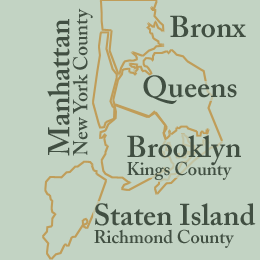Appearing in Court
In General
Settlement
Choosing a Judge or Arbitrator
Claimant Does Not Answer
Defendant Does Not Appear
In General
On the day of the hearing, you should arrive at the courthouse at least 30 minutes before the Small Claims session begins. Click on Directions, if you do not know how to get to the courthouse. You will have to go through magnetometers when you arrive. When you get to the Small Claims courtroom, look for a Small Claims Court calendar, usually posted outside the Small Claims courtroom. Your case will be listed by index number and by the last name of the claimant and defendant. If your case if not listed on the calendar, or if a calendar is not posted outside the Small Claims courtroom, speak to the court clerk.
Take a seat in the courtroom and wait for the clerk to call the calendar. You should be quiet so that you and others in the courtroom can hear. The clerk will announce your case and call your name. When your name is called, you should stand, repeat your name, and answer "ready," or if you are not ready to begin and instead need to ask for an adjournment, or if you have some other request, such as a counterclaim, or wish to add someone to the lawsuit, you should tell the court at this time by saying, "application." If either side requests an "application," you will be told to stay in the courtroom until you have the opportunity to speak with the judge. The judge will decide whether to grant or deny the application. If both sides to the action are ready, the case will be sent to an arbitrator, unless you request that your case be heard by a judge. You can learn more about what happens in front of the arbitrator or judge by clicking on Trial.
Settlement
The parties often discuss the case in an effort to reach a settlement. In a settlement, the parties determine the outcome of the case and there is no hearing before the judge or arbitrator. Many cases are settled, meaning the parties come to an agreement, usually called a "Stipulation of Settlement," which is written down and signed by the parties and the Judge. Many people choose to settle, rather than resort to a trial, because settlement is a quick and certain resolution of the dispute.
What a stipulation provides will depend on what the parties negotiate and the facts of the particular case. When you sign a Stipulation of Settlement, you are making a binding legal agreement that must be followed. Therefore, you must be very careful to read the agreement, understand it, and be certain that you will be able to do everything you have promised.
Choosing a Judge or Arbitrator
In Small Claims Court you can choose between having a Judge or an Arbitrator decide your claim. An arbitrator is an experienced attorney who is specially trained to hear and decide small claims. Because there are more Arbitrators available to hear cases than there are Judges, an Arbitrator will hear your claim more quickly. The hearing before an Arbitrator is informal. The Arbitrator applies the same law to your case as a Judge would apply.
One important difference between a Judge and an Arbitrator is that an Arbitrator’s decision cannot be appealed because there is no official record of the proceedings. A trial before a Judge will result in a decision that can be appealed, as the trial will be heard with a court reporter or recording device, there will be a court record necessary to process an appeal.
If you choose to have a Judge decide your case, you must say, "by the court," when your case is called. You will then have to wait until the Judge is available to hear your case. You may have to come back another night, if the Judge does not get to your case by the end of the session. Otherwise, you will be sent to an arbitrator. You will have to sign a consent form to have your case heard by an arbitrator.
Claimant Does Not Appear
If the clerk calls your case on the calendar and the claimant does not answer and appear, the claim will be dismissed without prejudice and you may go home. However, the claimant may start a case against you for the same claim in the future.
Defendant Does Not Appear
If the clerk calls your case on the calendar and the defendant does not answer and appear, the court will direct an inquest. This means the judge or arbitrator will hear your case even though the defendant is not present. If the claimant presents enough evidence to establish his or her case, the judge or arbitrator will award a default judgment against the defendant. To learn more about this, click on Judgment.


